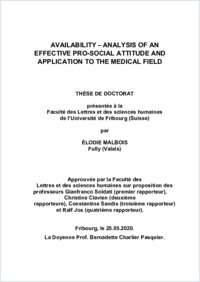Availability - analysis of an effective pro-social attitude and application to the medical field
BHAP-PH
- Malbois, Elodie
- Soldati, Gianfranco (Degree supervisor)
-
2020
1 ressource en ligne (234 pages)
Thèse de doctorat: Université de Fribourg, 2020
English
Short Abstract Sympathy is often considered to be a pro-attitude central to our social lives. I argue, however, that it is epistemically weak and thereby not effective on its own. We are in need of another attitude that combines the motivational aspect of sympathy with a more cognitive component that enables us to understand others. In this thesis, I argue that availability, a concept introduced by Gabriel Marcel, is just the candidate we are looking for. I offer a definition of availability, describe its effects and its role and argue that it is essential to our social lives because it allows us to help others efficiently and to bond with them. I apply my results to medical care and claim that availability should be promoted and taught in medical schools. Long Abstract Empathy and sympathy are widely praised. Many consider that our ability to be moved by the plight of others is central to our social and moral lives. It unites us, allows us to bond and, very importantly, motivates us to act morally towards others by helping them. By putting so much emphasis on those emotional attitudes, however, we tend to forget that understanding others accurately is just as essential. We can be deeply empathetic and sympathetic, but if we don’t understand what someone needs, we will not be able to effectively help her. Felt understanding is also a key ingredient of bonding and satisfying relationships, and we all seem to long for it. How then can we make empathy or sympathy effective and how should we complement them? I argue that we can find a strong candidate in Gabriel Marcel’s concept of availability. Availability seems to involve the motivational pro-social element of sympathy, but in addition, it puts us in an ideal position to understand others accurately. In the first part of the 20ᵗʰ century, several philosophers such as Marcel, as well as Simone Weil and Martin Buber, described availability and claimed it is crucial for our ability to relate to others. However, none of them provided a precise and systematic treatment of the notion. Although the concept has been popularised by Carl Rogers in psychotherapy under the names of “empathy” and “active listening”, it is still not clear what it is. Nonetheless, all those who speak about it say that it is highly important. The aim of this thesis is to build the case for availability by investigating more precisely what it is and what its effects are and to start to explore its practical applications by describing its role in the field of medical care. In the first part of the dissertation, I review existing accounts of availability to see if we can understand it better. I argue that these do not provide us with a definition of availability, but that they enable us to identify its four core features. Based on these features, I am then able to define availability. I can then describe the phenomenon more precisely and systematically and contrast it with other concepts that are closely related and with which it could be confused such as empathy, sympathy, care and respect. In the second part of the thesis, I investigate the effects of availability and the role that it plays in our social lives. I argue that it greatly enhances our chances to understand another accurately. I distinguish between two types of interpersonal understanding, propositional and experiential, to further describe the effects of availability. I claim that being available is an efficient way to come to know what others need and to be motivated to help them. Although it is not the only means to reach this result, availability has the advantage of sustaining feelings of sympathy and closeness which allow us to bond with others and to develop relationships with them. I also try to make sense of Marcel’s claim that we see others as persons only when we are available to them. To do that, I delve into what interpersonal understanding consists in and why it is so important to us and yields closeness. I finish by applying the work done to the domain of medicine. I argue that the ability of physicians to be available towards their patients is central to good care and that it would be better to promote availability rather than sympathy in medical schools. I prepare the ground for future research by discussing how the claims defended in this thesis could be empirically tested and how availability could be taught.
- Faculty
- Faculté des lettres et des sciences humaines
- Language
-
- English
- Classification
- Philosophy, psychology
- Notes
-
- Ressource en ligne consultée le 24.09.2020
- License
- License undefined
- Identifiers
-
- RERO DOC 329402
- URN urn:nbn:ch:rero-002-118840
- RERO R009082680
- Persistent URL
- https://folia.unifr.ch/unifr/documents/308886
Statistics
Document views: 358
File downloads:
- MalboisE.pdf: 432
